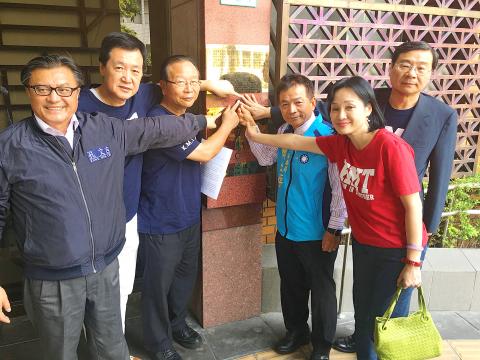The Chinese Nationalist Party (KMT) caucus yesterday brought legal charges against Minister of Economic Affairs Shen Jong-chin (沈榮津), accusing the ministry of agreeing to purchase wind power from seven local and foreign firms at a greatly inflated price, which would result in taxpayers losing NT$900 billion (US$29.5 billion).
The ministry, in a first round of tenders, awarded the bid to the seven companies at NT$5.8 per kilowatt-hour (kWh), but in the second round, which began about two months later, accepted offers from other companies to supply wind power at less than half that price — NT$2.5 per kWh, KMT caucus whip Lin Te-fu (林德福) told a news conference.
Lin said he suspected that some parties have raked in an exorbitant profit and called on prosecutors and investigators to investigate the contracting process.

Photo: CNA
The first bid awarded by the ministry was for 3.83 million gigawatts of wind power over 20 years, which when taking into account the price difference between the two tenders, would translate to a loss of more than NT$900 billion of taxpayers’ money, KMT caucus deputy secretary-general William Tseng (曾銘宗) said.
Unlike the second call for bids, the first was an “opaque” selection process, which was “odd,” as government agencies usually hold open bidding to bring down the price when contracting work, before introducing a selection process when subsequently soliciting tenders, he said.
The ministry seemed to be “doing things backwards,” and he suspects misconduct, Tseng said.
It is the KMT caucus’ firm stance that the first bid awarded for the project should be revoked, KMT Legislator Lai Shyh-bao (賴士葆) said.
The ministry had “not done its homework” before the first call for bids and was ingratiating itself with President Tsai Ing-wen (蔡英文) and Premier William Lai (賴清德) by carrying out the Democratic Progressive Party’s (DPP) “impractical” energy policy to phase out nuclear energy, while boosting the proportion of renewables to 20 percent in 2025, Lai Shyh-bao said.
Following the news conference, six KMT legislators — Lin, Tseng, Lai Shyh-bao, Alex Fai (費鴻泰), Ko Chih-en (柯志恩) and Yosi Takun — lodged a suit against the ministry at the Taipei District Prosecutors’ Office.
Responding on behalf of Shen, Deputy Minister of Economic Affairs Tseng Wen-sheng (曾文生) called a news conference and said the price of offshore wind power had gradually risen from NT$4.19 per kWh in 2009 to NT$6.04 per kWh last year, before slightly falling to NT$5.8 per kWh this year.
If the ministry had wanted to benefit companies, why then would it initiate an open bidding process in the second round to drive down costs? he asked.
The government offered to pay NT$5.8 for each kWh of offshore wind power because no contractors were willing to undertake the project at NT$5.7 per kWh, he said.
If the bids awarded in the first-round call for tenders were revoked, it could discourage contractors from the second round and jeopardize the entire project, he said.
The ministry would humbly accept any criticism of its policies, but cannot tolerate unfounded accusations and character assassinations targeting public servants, he said.
Additional reporting by CNA

A preclearance service to facilitate entry for people traveling to select airports in Japan would be available from Thursday next week to Feb. 25 at Taiwan Taoyuan International Airport, Taoyuan International Airport Corp (TIAC) said on Tuesday. The service was first made available to Taiwanese travelers throughout the winter vacation of 2024 and during the Lunar New Year holiday. In addition to flights to the Japanese cities of Hakodate, Asahikawa, Akita, Sendai, Niigata, Okayama, Takamatsu, Kumamoto and Kagoshima, the service would be available to travelers to Kobe and Oita. The service can be accessed by passengers of 15 flight routes operated by

MORE FALL: An investigation into one of Xi’s key cronies, part of a broader ‘anti-corruption’ drive, indicates that he might have a deep distrust in the military, an expert said China’s latest military purge underscores systemic risks in its shift from collective leadership to sole rule under Chinese President Xi Jinping (習近平), and could disrupt its chain of command and military capabilities, a national security official said yesterday. If decisionmaking within the Chinese Communist Party has become “irrational” under one-man rule, the Taiwan Strait and the regional situation must be approached with extreme caution, given unforeseen risks, they added. The anonymous official made the remarks as China’s Central Military Commission Vice Chairman Zhang Youxia (張又俠) and Joint Staff Department Chief of Staff Liu Zhenli (劉振立) were reportedly being investigated for suspected “serious

ENHANCING EFFICIENCY: The apron can accommodate 16 airplanes overnight at Taoyuan airport while work on the third runway continues, the transport minister said A new temporary overnight parking apron at Taiwan Taoyuan International Airport is to start operating on Friday next week to boost operational efficiency while the third runway is being constructed, the Ministry of Transportation and Communications said yesterday. The apron — one of the crucial projects in the construction of the third runway — can accommodate 16 aircraft overnight at the nation’s largest international airport, Minister of Transportation and Communications Chen Shih-kai (陳世凱) told reporters while inspecting the new facility yesterday morning. Aside from providing the airport operator with greater flexibility in aircraft parking during the third runway construction,

Taiwanese and US defense groups are collaborating to introduce deployable, semi-autonomous manufacturing systems for drones and components in a boost to the nation’s supply chain resilience. Taiwan’s G-Tech Optroelectronics Corp subsidiary GTOC and the US’ Aerkomm Inc on Friday announced an agreement with fellow US-based Firestorm Lab to adopt the latter’s xCell, a technology featuring 3D printers fitted in 6.1m container units. The systems enable aerial platforms and parts to be produced in high volumes from dispersed nodes capable of rapid redeployment, to minimize the risk of enemy strikes and to meet field requirements, they said. Firestorm chief technology officer Ian Muceus said